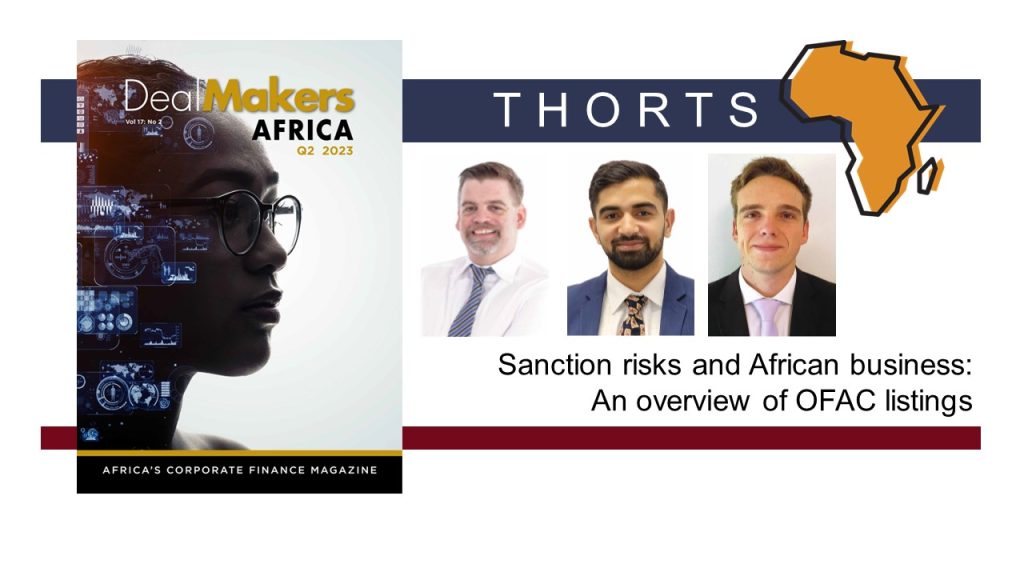In the past few months, the United States’ (US) Treasury Office for Foreign Assets Control (OFAC) and the Department of Commerce’s Bureau of Industry and Security (BIS) have announced significant violations of US sanctions and export controls while imposing further sanctions on Russian and Belarussian entities. The interconnectedness of global markets means that the sanctions imposed on Russian and Belarussian entities have ripple effects on African and linked entities, particularly those involved in trade and business partnerships with the sanctioned entities. The impact of such sanctions on African entities is often indirect but existential, as they can create economic and trade disruptions, limit access to financial services, and impact reputation.
This article unpacks the OFAC listing and delisting process (OFAC listing) and discusses some of its likely impacts for African businesses.
Entities are listed by OFAC as part of a process which develops from identifying entities which may be engaging in sanctionable activities, investigating those entities and their activities, and coordinating a review with other US government agencies before publishing an OFAC listing. Collectively, the OFAC-listed individuals and entities are referred to as Specially Designated Nationals or SDNs. Being listed by OFAC imposes economic and trade sanctions on the listed entity. Upon listing, an entity is likely to experience several immediate impacts which disrupt trade and limit access to financial services.
The listed entity is likely to first be notified of its designation by its banks, which would typically inform the entity that its bank accounts will be closed. Further notices may follow from other sources, including that the entity’s US assets will be frozen, and that existing commercial relationships may be severed (especially with US companies and citizens).
After being OFAC-listed, an entity will need to apply for delisting and take other immediate actions to prevent further harm. The process of being removed from OFAC listing is complex, time-consuming and arduous.
A formal application seeking OFAC delisting must be submitted to the US Department of Treasury. The adjudication of an application is not an objective judicial process, and no third-party, independent oversight exists for OFAC delisting applications. Delisting applications also have a higher legal standard of evidence than OFAC listings, so it is easier to be listed by OFAC than it is to be removed from the OFAC list with the same evidence. Nevertheless, the US government is required to operate broadly under sets of rules and cannot act arbitrarily. Should an entity wish to engage with OFAC, OFAC is required to respond, provide information and engage with the listed entity. Further, OFAC is held to the reasons that it used to make the listing determination in the first place.
The OFAC listing of individuals poses a major challenge as people cannot change their family or their relations, but commercial businesses are different. If a commercial business becomes OFAC listed, it is important that it severs ties with any OFAC-listed entities to limit its exposure. This can include disinvestments by designated entities, removal of designated entities from commercial structures, disengaging in existing commercial ties, and changing business approaches.
US entities are generally prohibited from any commercial relationship with OFAC-listed entities. Since listed entities cannot transact with US persons, US-exposed entities may experience the most significant financial impact. Non-US persons should also be cautious of transacting with listed entities as they may be subjected to secondary sanctions. If a sanctioned entity has a controlling interest in any other entities, each of these entities is also automatically designated. Accordingly, it is important for businesses to be aware of these designations and their potential bearing on commercial activities, particularly if they have significant connections to US entities or operate and trade in US dollars.
Most financial institutions with US relationships will prevent transactions with listed entities, and financial institutions based in the European Union and United Kingdom may also adopt OFAC decisions. Financial institutions may initially be inclined to summarily terminate their relationships with designated entities, but they have a duty to act fairly and reasonably in all their dealings with clients. While the banking sector understands the scope of OFAC’s jurisdiction and ensures broader compliance with OFAC and the Organisation for Economic Cooperation and Development (OECD) guidelines, these may contradict the contractual agreements between the banks and their now OFAC-listed clients. Should African Banks service any designated entities, the banks are placed in a challenging position as they face conflicting demands in servicing or terminating their relationships with sanctioned entities.
African bank accounts may also be needed for sanctioned intermediaries to conduct their business and pay their employees and suppliers. Should a bank proceed to close its accounts, sanctioned intermediaries will have no option but to seek urgent relief from the courts and pursue a claim for damages and costs against the appropriate bank.
The only way for designated entities to reassure the banking sector is to approach the US Treasury for removal of the designation. Hence, it is important for sanctioned intermediaries to seek proper legal recourse and explore options for delisting to avoid financial, reputational and commercial damages. Given the unique nature of the application and issues to delist from the OFAC list, it is best attended to by experienced attorneys who specialise in this area.
Brandon Irsigler is a Partner, Noushaad Omarjee a Senior Associate and Davin Olen a Legal Professional Assistant | Dentons South Africa

This article first appeared in DealMakers AFRICA, the continent’s quarterly M&A publication.
DealMakers AFRICA is a quarterly M&A publication.
www.dealmakersafrica.com



